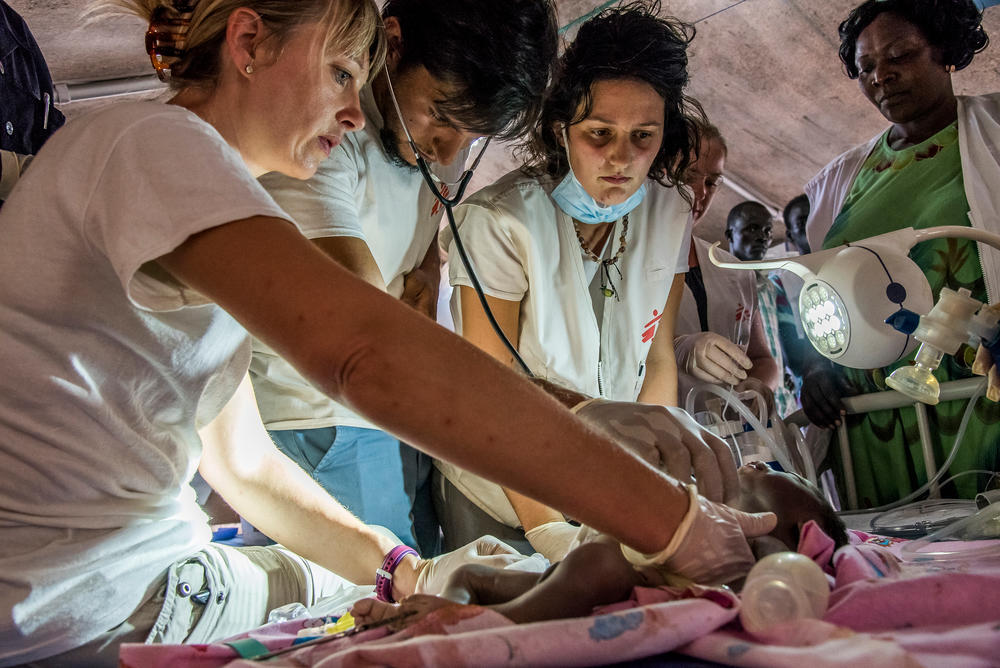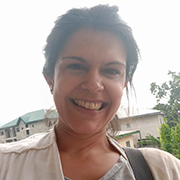Prepared for the pandemic: How responding to crises with MSF has helped me in the NHS
NHS nurse Miriam Franca explains how working in challenging environments with MSF can help create a team of stronger staff back in the UK's healthcare service.
Along with videos from three other NHS staff, she shares her story.
Before I joined the NHS, I used to work as a nurse and team leader in a very busy emergency department in the Lisbon area of Portugal. I’ve now been a nurse in the NHS for two and a half years, covering several roles.
"There have been everyday challenges I have learned to overcome in my time with MSF"
I first worked in Leicester treating kidney patients on haemodialysis and in an outpatients department, before moving to Brighton to join A&E and the community rapid response team. Most recently I’ve been a bank nurse in London, again in A&E.
Working around the world
Right now, I’m part of the response to the coronavirus pandemic, working at COVID Care. This is a special MSF project set up to treat members of London’s homeless community for COVID-19.
But, this is not my first assignment with MSF. In fact, it’s my fifth.
I first joined in 2015, working in Guinea Bissau as an outreach nurse tackling the high child mortality rate in the community.
Since then I have also been to the Central African Republic, where I managed a hospital nursing team and worked on a mass measles vaccination campaign, before returning to Guinea Bissau again to help during a malaria outbreak. My most recent overseas deployment was to Cameroon’s northwest region.
In total, I’ve spent one year and nine months working in MSF field projects across west and central Africa. All in-between my roles as an NHS nurse.
Overcoming challenges
Of course, there have been everyday challenges I have learned to overcome in my time with MSF.
Working with cultural differences can sometimes be a challenge – not only because we are working in a new country, but also because our international teams are made up of staff from different parts of the world themselves.
There is also what I would call “underdevelopment”. As international staff, we can often be used to working with more resources at home than are available in a project. We need to learn to adapt to these limitations to still deliver the highest quality of care to our patients. It can also be difficult to come to terms with the impact of inequality in the many places we work.
Coming back to the NHS
In the beginning, I actually found it quite difficult working for the NHS again after my MSF experience.

Help us prepare for the next emergency
It was just the opposite, in many ways. We have so many resources involved in the care of one person. Whereas in the parts of Africa that I worked, it might be just one doctor available to treat so many sick children.
It made me think about how much inequity exists in this world, and healthcare globally. It can feel like different planets sometimes.
Expertise in an outbreak
I know that my MSF experience has given me the mental tools and expertise to respond to a disease outbreak – such as the current COVID-19 pandemic. I have the knowledge to help avoid a virus spreading and I can act fast.
I can work on a situation assessment and implement a plan. I can simplify things and focus on what needs to be done.
"For me, working with MSF has been invaluable. I have grown and matured in my practice as a nurse."
We know that any delays at all can translate into avoidable deaths. So, I work to make sure that action is happening on different levels at the same time – through prevention, health education campaigns, vaccinations (when available) and individual case management. All delivered by a reliable and respectable chain of command. Basically, to get the job done.
Most importantly, when you work with MSF, you feel very much that you are all part of the same team. There is no disconnect between leadership and the staff – something that I think can set us apart from other healthcare organisations. This is a real feeling of team spirit that we bring home with us.
Becoming a better nurse
I would strongly recommend other NHS medical staff to apply to MSF. It has helped broaden my experience and reconnect with why I became a nurse.
By overcoming challenges and challenging your own mindset, it helps to improve your practice and make you more versatile and resilient. I have also enjoyed learning about tropical diseases and being able to apply new knowledge and experiences to different settings.
However, working with and meeting wonderful people that, over the course of assignments, have become like a second family to me has also been a big positive. In fact, I think the experience can improve a nurse’s ability to work in a team and their ability to contribute to a positive environment.
For me, working with MSF has been invaluable. I have grown and matured in my practice as a nurse.

